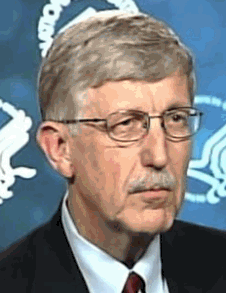|
News & Views item - August 2012 |
![]() NIH Director Issues an Apologia for Proportionality of Research Funding and
Throws Down a Challenge to the Biomedical Research Community. (August 4,
2012)
NIH Director Issues an Apologia for Proportionality of Research Funding and
Throws Down a Challenge to the Biomedical Research Community. (August 4,
2012)
 US
National Institutes of Health Director Francis Collins in this week's editorial
for the journal Science addresses the criticisms that have been
levelled at his fostering of translational research at the expense of basic
biomedical research which he defines as the "systematic study directed toward
fuller knowledge or understanding of the fundamental aspects of phenomena and of
observable facts without specific applications in mind".
US
National Institutes of Health Director Francis Collins in this week's editorial
for the journal Science addresses the criticisms that have been
levelled at his fostering of translational research at the expense of basic
biomedical research which he defines as the "systematic study directed toward
fuller knowledge or understanding of the fundamental aspects of phenomena and of
observable facts without specific applications in mind".
Dr Collins goes on to list the proportion of funding support for basic research since 2003 by the NIH to have ranged between 53% - 57% with the current proportion being 54%. In short those suggesting a significant shift on NIH funding are going to have to look to the organisation "cooking the books" to support their contention.
Dr Collins then asks the rhetorical question: "But what is NIH doing to fuel the next generation of breakthroughs?" And follows with a list of some of the fundamental research programs the Institutes are funding from "understand the roles of microRNAs" to "a trans-NIH effort to map the brain's wiring in high resolution". But perhaps more to the point is the NIH Common Fund's High-Risk/High-Reward program which has grown from $7.3 million in 2004 to $191.8 million in 2011. "These awards," Dr Collins writes, "Are open to exceptionally creative scientists in any area of biomedical research, and if past trends continue, basic research will dominate." Whether or not this is a redirecting of funds already earmarked for basic research isn't addressed.
As a parting shot he lays it onto the biomedical research community as a whole to make its case to the nation's population in its entirety:
In this time of severe budget constraints, Americans need to know that today's basic research is the engine that powers tomorrow's therapeutic discoveries. They need to know that basic research is the type of science that the private sector, which requires rapid returns on investment, cannot afford to fund. They need to know that, because it is impossible to predict whence the next treatment may emerge, the nation must support a broad portfolio of basic research. And they need to hear it from all aboard the biomedical research ship.